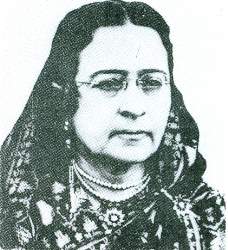 Mrs. Suogra Humayun Mirza was born in December, 1882 in Hyderabad. Her father Dr. Safdar Au Mirza, was a Captain - Surgeon in the Nizam’s Army and a Turk by nationality. Dr. Safdar Ali Mirza’s father migrated to Hyderabad during the reign of Nizam Ali Khan, Asaf Jab II.
Mrs. Suogra Humayun Mirza received her early education at home. She was married to Syed Humayun Mirza, Bar-at-Law, in December, 1900. From 1902 she began to take an interest in national work.
Mrs. Suogra Humayun Mirza was born in December, 1882 in Hyderabad. Her father Dr. Safdar Au Mirza, was a Captain - Surgeon in the Nizam’s Army and a Turk by nationality. Dr. Safdar Ali Mirza’s father migrated to Hyderabad during the reign of Nizam Ali Khan, Asaf Jab II.
Mrs. Suogra Humayun Mirza received her early education at home. She was married to Syed Humayun Mirza, Bar-at-Law, in December, 1900. From 1902 she began to take an interest in national work.
In 1912 along with Begum Khedive Jung, she formed an association “Anjuman-iK havatin Deccan” and she was the Secretary of the Association for three years. She also started two schools for girls under the aforesaid association. During the same year educated Hindu ladies formed a Ladies Union and Suogra Humayun Mirza was given the honour of being the only non-Hindu member of the union.
She was interested in literary pursuits and contributed many articles to various newspapers and magazines advocating social reforms. She was the author of several books on women’s education.
In appreciation of her work and her literary efforts the high officials and nobles of Hyderabad presented her with a gold medal.
In 1920 she was made an honorary member of the Hyderabad Text book Committee and also a member of the Indian branch of the International Congress Moral Education (London). In 1923, she was made a member of the Royal Asiatic Society of London. She was a poetess. She assisted in collecting funds for Aligarh College and relief for the sufferers of the Musi floods of 1908, and even for the victims of an earthquake in Persia.
Suogra Humayun Mirza travelled a good deal in Arabia, Persia and Europe to widen her knowledge. She was presented to the Queen and attended a Royal Garden party in London.
In Switzerland she was the guest of deposed Calif Sultan Abdul Majeed II. The subject of her lectures and writing were of varied interest such as Hindu-Muslim unity, evils of Purdah system, encouragement of the use of Swadeshi goods, prevention of cow slaughter, need of national universities and vernacular medium of instruction. She donated land and started a school at Masab Tank, now known as Safdaria Girls School which has nearly 1000 students. Humayun Nagar locality is named after her husband.
|